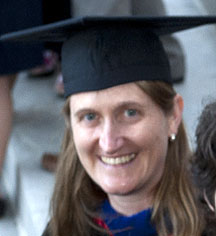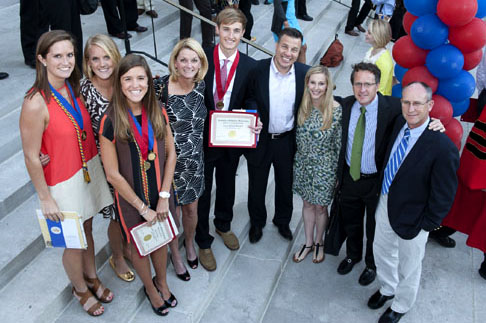Physicist Jodi Cooley: Text of 2012 Honors Convocation Speech
On April 16, 2012, SMU held its 14th Annual Honors Convocation. During Honors Convocation, the University celebrated the academic excellence achieved by SMU students. The speaker was Jodi Cooley, Assistant Professor of Experimental Particle Physics.
The University celebrated the academic excellence achieved by students during its 14th annual Honors Convocation on April 16, 2012. Giving the principal address was dark matter researcher Jodi Cooley, SMU Assistant Professor of Experimental Particle Physics, whose investigations are helping us better understand how the universe is put together. Following is the text of her speech:
FAILING UP
By Jodi Cooley
Thank you President Turner for such a nice introduction and thank you Provost Ludden for inviting me to speak here today.
 Jodi Cooley |
Let me start by offering my congratulations to today's award recipients. It is truly an honor to be here today to celebrate your success. We are very proud of you.
I grew up in a beautiful town of 3,000 people in northern Wisconsin. In high school I did well in both academics and athletics. I was the first person in my family to go to college. I went to the University of Wisconsin - Milwaukee on an athletic scholarship as long distance runner on the track and cross country teams. During my first year on the team, I found myself in my coach's office. At some point in our conversation, I said, “My goal is to get through this program without any injuries.” My coach said to me, “Jodi, if you don't get injured, you're not working to your potential.” His reasoning was that if you are constantly working at the edge of your abilities, injury was inevitable. I think that this can be applied to life. If you are working at the edge of your abilities, whatever the context, eventually you will fail. There is no possibility of success without the risk of failure. It is what we do with these failures that ultimately determines our successes in life.
I would like to share a personal story of a failure I encountered as an undergraduate. During my junior year, I decided to take a course that I was not quite prepared for. This course was Advanced Electricity and Magnetism - a core course that is required for a degree in physics. This course had a prerequisite of Vector Calculus, a math course that I had not yet taken. I had let a group of friends who were further along in their studies, convince me that I could take Vector Calculus, concurrently with Electricity and Magnetism. They told me that I would not have too much trouble. I talked with the professor teaching the course and he, too, thought this was reasonable and agreed to grant me admission.
I need to take a moment to tell you about this course and the professor teaching it. I am sure everyone in the audience can remember that one teacher from whom taking a class felt like a rite of passage. If you know the story of Harry Potter, this teacher would have played the role of Professor Snape and you would have felt like he had something against you just for living in Gryffindor. No matter what you did, it would never be good enough. There is no way out because every young wizard had to pass potions. Well, for a young physicist there was no way out of advanced electricity and magnetism and the instructor teaching this course was the Professor Snape of the UW-Milwaukee physics department.
 See a slide show from Honors Convocation.  |
I knew heading into the midterm exam for that course that things were not going very well. However, I didn't realize how bad things were until I got my midterm exam back. I had scored a 10. That is 10 out of 100 -- a 10%. I was mortified. I couldn't understand how this had happened. Although Professor Snape encouraged me to withdraw from the class, I was sure I could turn it around. Since I had gone to college on an athletic scholarship, the athletic department provided free tutoring for courses upon request. So, I got myself a tutor and redoubled my efforts. I continued to work with my study group on new material and with my tutor I worked on review material.
When it came time for the final exam, I was more prepared than I was for the midterm and was confident I would pass. I knew an A was realistically out of the question, but I thought a strong performance might convince Professor Snape to give me a B-. I took the exam and when I got it and my final grade back I couldn't believe it. I had scored nearly 400% better than the midterm and had earned an F+ as a final grade.
Let me assure you that an F+ is not a grade that exists at UW-Milwaukee. But if you were to look at my transcript, it would be there. Professor Snape was so powerful that apparently he could assign grades that didn't even exist!
I am not sure that there are words to describe how I felt at that time. Mortified is certainly not strong enough. It was a crisis and questions kept running through my mind. How was I going to tell my parents? I grew up in a household where my parents gave us 25 cents for each A we earned on our report card, Bs were free and we paid 50 cents for Cs. What goes on below that was not even talked about. How was I going to find a job? And worse yet -- I was going to have to take this course again! In order to be ready for it a second time, I was going to have to take more math and more physics. This was not something I was looking forward to at the time.
I learned several lessons from this incident. First and foremost: don't give into peer pressure. Second, I had learned about myself. Up to that point, I had never worked so hard in my academic life. Several years after this F+, I would enter a physics graduate program at the University of Wisconsin - Madison that was ranked 16th in the nation. Earning a Ph.D. from that institution is the hardest, most trying thing I have ever done in my life. As ironic as it may seem, I think that learning how to work at the edge of my abilities in Advanced Electricity and Magnetism, helped me to excel in school - a place where the curriculum demands that students constantly work at the edge of their abilities. Finally, I learned that despite my best efforts, at that time and in that place, I would fail and there was nothing I could do about it. I had to learn to live with the choices I made and those choices were my responsibility. I appreciate the opportunity that Professor Snape gave me to challenge myself. It was not his fault that I had failed.
The following year, after additional math and physics classes, I took Advanced Electricity and Magnetism again and that time I passed. You may wonder if there were any repercussions from this one F+. Well, my parents did not disown me. They were surprisingly understanding and supportive. However, my sister still holds it over my head to this day. It certainly did hurt my GPA for a while — but it didn't prevent me from going on to a top graduate school, doing postdoctoral studies at both MIT and Stanford University and ultimately coming here to join the faculty at SMU. Despite my F+ those many years ago, I won an NSF Early Career Award — one of the most prestigious awards a physicist at my level can win.
I have one more story of failure to share with you today. In the recent book by the author Michael Lewis entitled “Moneyball” and the movie of the same name, we get a glimpse into the world of baseball and the life of Billy Beane. Billy Beane was a remarkable high school athlete who excelled in multiple sports. In 1980, he was drafted in the first round by the New York Mets baseball team. The scouts all believed that Billy was destine to become a big league star. However, the scouts missed something very important. Because things so often went well for Billy, they never noticed that when things didn't go well, Billy couldn't handle it and he would break something. In “Moneyball”, author Michael Lewis says, “It wasn't merely that he didn't like to fail, it was as if he didn't know how to fail.”
Billy Beane never became a big league star. In part, this was likely due to his inability to deal with his failure in the batter's box in a constructive way. His life took him in a different direction. He quit playing baseball in 1989 and moved to the front office, eventually becoming the general manager of the Oakland A's.
He knew from his own experience that there was a problem in the way that the scouts assessed talent. At that time talent was assessed on the feelings of the scouts. A scout may have dismissed a player because his girlfriend was unattractive or because he looked funny when he threw a ball. Billy decided to take a risk — he moved outside the comfort zone and decided to put together a team based on science and not feelings. His strategy was simply to hire players that could get on base but were undervalued for many reasons by the scouts.
Billy Beane's strategy worked. In 2002, the Oakland A's won as many games as the New York Yankees and on a much smaller budget. In addition, Billy had secured a place for the Oakland A's in the playoffs. Although they ultimately lost to the Minnesota Twins, Billy's strategy had changed the lives of ballplayers whose virtues had been overlooked by the scouts and it changed the face of baseball today.
Billy Bean knew from his failure as a baseball player that something was wrong with the way scouts assessed players. He took his own failure and learned from it. He stepped outside the comfort zone of doing things the same old way and tried something new, using science. Although the A's did not win the World Series, I think one can only conclude that Billy Bean succeeded by inspiring protégés who went out and changed the face of teams like the Toronto Bluejays and the Boston Red Sox.
It was Henry Ford who said, “Failure is the opportunity to try again, this time more intelligently.”
I think there is much wisdom in those words. In this spirit, I conclude today with a challenge to you. First, strive to live outside your comfortable zone - increase your chance of failure in life. By this I am not suggesting that you do as I did and sign up for a course for which you are clearly not ready. I just mean that you will not reach your potential if you are not challenging yourself. So, take a risk and try something you are unsure about. My second challenge is when you do encounter your F+ in life, be sure to fail up! Get back up, dust yourself off and try again, this time more intelligently.
Thank you.
# # #